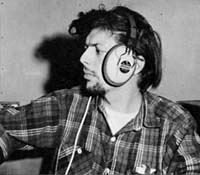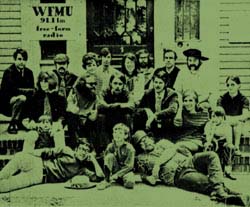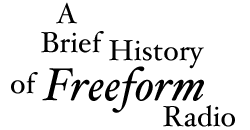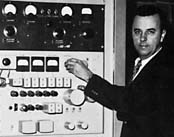
Roger Dangerfield on the air, 1969
|

The WFMU Staff in 1969 
|
|
WFMU didn't invent freeform radio, but it has
sustained freeform far longer than any other station. The first freeform
programs were broadcast on KPFA (in 1949), followed in the early Sixties
with KRAB and WBAI. In the late Sixties, there was a nationwide
explosion of commecial freeform stations, but most didn't last more than
a few years. WFMU has been the only one of the early freeform stations
to survive into the present day, with it's philosophy and (lack of)
format intact.
KPFA-FM in Berkeley was the first "community" or "public" station in the country. Visionary and pacifist Lewis Hill founded KPFA and Pacifica, advocating a station dedicated to free expression that offered access to the airwaves for radical cultural and political ideas. Hill believed that a station could be truly free only if it raised it's money from the people who were listening to it. He scrapped plans to support KPFA commercially and began broadcasting low-key solicitations of charitable contributions. John Leonard was producing collages of music, poetry and satire on his KPFA program Nightsounds on KPFA shortly after the station signed on in 1949. Hill's ideas, and Leonard's approach spread to WBAI in New York, with Chris Albertson's program, Inside. and later to the programs of Bob Fass, Steve Post and Larry Josephson, who provided the inspiration to Vin Scelsa, the founder of freeform on WFMU. But no one did more to lay the groundwork for freeform than Lorenzo Milam, a KPFA staffer, and a disciple of Lew Hill who wanted to take Hill's ideas a few steps further. Milam founded KRAB, Seattle in 1962, heralding an approach he called "Free Forum." Although the early KRAB was somewhat rigid in its approach, Milam loosened up and went on to found 30 other stations (known at the time as the "KRAB Nebula") in the West, South and Midwest. Milam quit radio when he saw most of his stations descend into internal bickering and identity-based politics and programming. By the time Vin Scelsa and his cohorts had taken over WFMU by mid 1968, the term "free forum" had segued into "freeform." On WFMU, as on WBAI at the time, this meant a type of radio that encompassed not only eclectic music, collage and satire, but also an intimate, live interaction with the listening audience. WFMU has remained dedicated to this approach for nearly thirty years, losing its way briefly in the Seventies following a 1969 staff walkout and Upsala College's subsequent ten-month shut down of the station. While the non-commercial strain of freeform radio stretches from the late 40s to the present day, a shorter lived, commercial version flourished briefly in the late 60s to early Seventies. Commercial freeform began on KMPX, San Francisco and WOR-FM, New York. Known at the time as "progressive" or "underground," dozens of such stations emerged around the country as two disparate phenomenon came to a head simultaneously. First, the popularization of the counterculture proved a ready market for love beads and fake sitars. Second, the FCC's non-duplication rule, in the works since 1962, went into full effect between mid 1965 and 1967. The rule prohibited FM stations from merely retransmitting the programming of their AM Sister Stations. The FM dial had been underdeveloped for decades due to RCA's resistance to the new band and the World War II freeze on new stations. The non-duplication rule forced hundreds of urban FM stations to develop new formats overnight. Many adopted freeform, including WBCN in Boston, WHFS Baltimore, WXRT Chicago and WABX Detroit. Almost all of these stations made a rapid transition to heavily scripted Album Oriented Rock (AOR) format. Even WFMU aped commercial AOR formats when Upsala College reopened the station in 1970. It took over five years for the freeform idea to bubble back up to the top, and when it did, various musical revolutions (punk, experimental, international) were there to meet it.
|
|
WFMU Homepage | LCD Contents page | Hear Our Signal |
| © 1998 WFMU.
All rights reserved. Reproduction in whole or in part in any form or medium without express written permission of WFMU is prohibited. |
